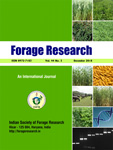Mutation induced genetic variability for two important components of fodder yield in berseem (Trifolium alexandrinum L.)
Usha Dalal, R. Avtar, O. Sangwan*, S. K. Pahuja and Amit Singh
Department of Genetics and Plant Breeding
CCS Haryana Agricultural University,
Hisar-125 004 (Haryana), India
*(e-mail : osangwan@gmail.com)
(Received : 18 December, 2012, Accepted : 1 February, 2013)
SUMMARY
Seeds of berseem variety Mescavi were treated with three doses (50, 70 and 100 kR) of gamma rays and three doses (0.1, 0.3 and 0.6%) each of methyl methane sulphonate (MMS), diethyl sulphonate (DES) and sodium azide (SA) to study the induced genetic variability, heritability and genetic advance for plant height and tillers per plant, the main components of fodder yield. The estimates of genotypic and phenotypic coefficients of variation were higher for tillers per plant in comparison to plant height which were indicative of induction of wider genetic variability for this trait due to mutagenesis. The estimates of high heritability (broad sense) coupled with high genetic advance (% of mean) were observed for plant height in treatments of 70 kR gamma rays and 0.6 % MMS, whereas for tillers/plant medium heritability with high genetic advance was recorded for all the three treatments of MMS.
Key words : Mutation, genetic variability, fodder yield

